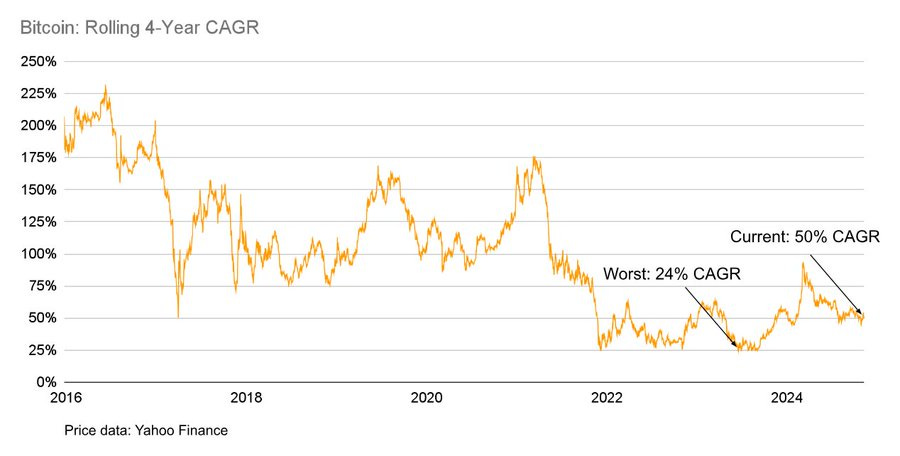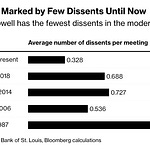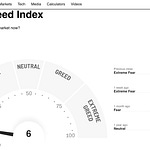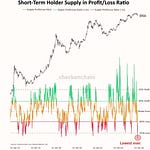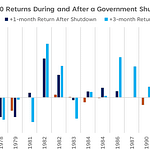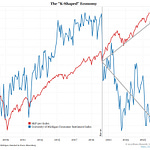To investors,
I was interviewed by Fox Business’ Charles Gasparino yesterday at the 10X Wealth Conference in Miami, Florida. One of the topics we spent time on was bitcoin’s volatility. This is a common critique used by traditional market participants, but those critiques led me to think more deeply about the pros/cons of bitcoin’s volatility.
I should start by saying young investors today should be known as the Volatility Generation. They seek out volatility more than those who came before them, while also being blessed to live in a time where financial markets were highly volatile.
Volatility is not good or bad. People like volatility when it goes in their favor (ex: you are holding a stock and the stock is volatile to the upside) and they hate volatility when it goes against them.
Next, volatility can have a profound impact on individuals and their financial life. Take US housing priced in bitcoin — we have seen a 99% reduction in the last 8 years to home prices when they are denominated in the digital currency.
A self-described “macro nerd” and “capital market enthusiast” shared this chart on Twitter, which hammers home how insane this price reduction has been (remember this is in log!):
This chart is backwards looking, but what if we take the information and apply it to the future? Thankfully, we can take a look at Mark Harvey’s work for this exact answer. Mark writes:
“The absolute worst 4-year compound annual growth rate (CAGR) for Bitcoin is 24%. This means that even if you bought BTC at the worst possible time and held it for 4 years, you would still achieve an average annual return of 24% on your money.
Running the numbers: BTC price if it was to return 24% annually and held for the next....
4 years: $215K
5 years: $267K
10 years: $782K
However, the current 4-year CAGR is 50%.
BTC price if it was to return 50% annually and held for the next...
4 years: $461K
5 years: $691K
10 years: $5.2M”
These numbers are wild to think about — bitcoin would end up between $782,000 - $5.2 million in the next decade according to the worst CAGR or the current CAGR. I am not predicting either of those prices, but rather explaining what the data says.
Now here is the most interesting question — will the compound annual growth rate of bitcoin slow down or accelerate in the coming years?
You can see in the chart above that the CAGR has been dropping since 2016. The easy answer is that an asset’s CAGR will drop as the asset gets bigger. But there are two data points that are worth considering for the counter-argument — investor interest and size of capital pools.
On the investor interest side, Wall Street Journal’s Gunjan Banerji recently tweeted:
“There has been a nearly unprecedented rush into stocks since the U.S. presidential election. U.S. equity funds recorded $56 billion of inflows last week, the second largest sum **on record** going back to 2008”
Record investor interest levels in stocks is bound to have an impact on bitcoin. Some of that exuberance will make its way to the more asymmetric asset, which could drive bitcoin’s CAGR higher in the short-term.
Additionally, the size of capital pools allocating to bitcoin are changing. We used to see individuals and family offices as the main buyer. Last cycle we started to see corporations. And this cycle is already driven by large financial institutions such as Blackrock, Fidelity, Franklin Templeton, and others.
Eventually we will see countries and central banks buying bitcoin as well. These large capital pools mean a strong tailwind for the asset, which could also drive the CAGR higher.
So what do I think?
The two points I bring up—investor interest and size of capital pools—are unlikely to accelerate bitcoin’s CAGR over the long-run. Instead, I could see those tailwinds helping to prevent the decay of the CAGR for longer than we would otherwise see. Crypto investors are jaded. They forget that a 50% CAGR in traditional markets would be INSANE.
If we can keep that rate going for another 5-10 years, there will be material wealth generated for any bitcoin holder, regardless of how many bitcoin they hold. This is the best case scenario in my opinion.
But my base case remains unchanged — I would expect bitcoin’s volatility to decrease, along with the compound annual growth rate, as we look out to the next 3-5 years. It is very hard for assets to gain substantial market cap and keep growing at the same growth rate. I don’t think bitcoin will be special in this department.
So the good news is that bitcoin is going to do very well in the future. The asset is likely going to be worth hundreds of thousands of dollars in the next few years. The only thing investors need to do is buy some bitcoin and chill. Don’t outsmart yourself. Don’t try to trade. Don’t get cute.
Just let the asset do what it was designed to do. Number Go Up technology is a real thing. I wouldn’t want to bet against it.
Hope you all have a great start to your week. I’ll talk to everyone tomorrow.
-Anthony Pompliano
Founder & CEO, Professional Capital Management
Anthony Pompliano on Fox Business Discussing The Bitcoin Strategic Reserve
Enjoy!
Podcast Sponsors
Blockstream Mining Note 2 (BMN2) is an EU registered and issued Bitcoin mining security token designed to outperform BTC returns. Learn more and view live analytics on our performance dashboard.
Gemini - The future is being built today. Go Where Dollar’s Won’t. With Gemini.
BetOnline is your #1 source for all your crypto sports and politics betting! Use our promo code POMP100 to receive a 100% matching bonus up to $1,000 on your first crypto deposit.
Xapo - Xapo Bank is the only way to bank with Bitcoin.
Polkadot is a scalable, secure, and decentralized blockchain technology aimed at creating Web3. Innovation leader, making it a preferred choice for big names.
ResiClub - Your data-driven gateway to the US housing market.
Professional Capital Management - Anthony Pompliano’s asset management firm is now on Linkedin. Please subscribe by clicking here.
You are receiving The Pomp Letter because you either signed up or you attended one of the events that I spoke at. Feel free to unsubscribe if you aren’t finding this valuable. Nothing in this email is intended to serve as financial advice. Do your own research.



